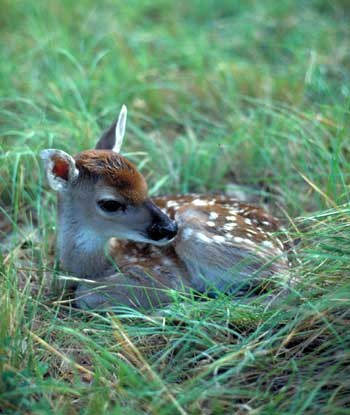"Orphaned" Wild Animals?
 Helping "orphaned" wildlife often means doing nothing.
Helping "orphaned" wildlife often means doing nothing.
Bluebonnets, warm days, and baby animals abound in spring, when most species produce new offspring. This is also the time when "Wildlife Rehab" specialists spring into action. Almost everyone would help an orphaned bird, or fawn or cottontail if they could. We all mean well. That's why it's important to know that most of these animals aren't really orphans. Animal parents rarely "abandon" their young before they're ready. They are rarely far away, but they are very good at staying invisible.
Sometimes trying to "rescue" an animal (picking it up, even taking it home) is the worst thing we can do to help it. Wildlife Rehab experts carry permits and are specially trained to care for truly sick, wounded and orphaned wildlife. Bringing them wild animals we pick up ourselves can make their jobs harder; "in the wild" is where these animals belong. If you run across an animal that appears orphaned or injured, please consider these tips:
Assess the Situation
Below are four specific situations you may encounter:
-
Offspring calling from a nest. Parent not present: Many animals deliberately avoid areas where their offspring are present. Such "hiding" behaviors reduce the chance of calling a predator's attention to the young. While you may not be able to see or hear a parent, it is likely nearby and in contact with its offspring. Feel free to observe the nest; see if the parent returns! If you still think the nest is "abandoned" you can place small sticks around it, without touching it. If after one day, the sticks have been disturbed, and the offspring still appear to be healthy, the nest has probably been visited by a parent.
- Blown-down nest: If the nest is fairly undamaged, and the birds or eggs are unharmed, put it back into the tree, or into a nearby tree. Parents will continue to tend it. A damaged nest can be placed into a strawberry basket or something of a similar size and placed in a tree. You may need to secure the nest to the branch with twine. One common fallacy is that birds reject their young if they acquire a human scent. In fact, few bird species have well-developed senses of smell. Please avoid excessive handling anyway. Predators CAN be attracted to human scents as they search for food.
- Grounded baby birds: Birds seen hopping on the ground "begging" for food DO NOT need your help. It is common for birds to fledge from the nest before they are fully feathered or ready to fly. They will eat on the ground for a day or two until they can fly. They may fly with a parent until they can forage on their own. If the bird on the ground is healthy, a parent is often attending it or foraging nearby. Careful observation can help you make a correct determination. If the bird is in a street, move it under a nearby bush. If you see dogs or cats, try to keep them away from the area. Never handle or move the fledgling from the area where it was found.
- "Abandoned" fawns: it is common for people to see deer that look orphaned or abandoned. This is because mothers often leave their fawns "bedded down" while they are away foraging. If the fawn is not crying or covered with ants, and its eyes are not swollen, and it has no visible wounds, avoid disturbing it. You would only cause it stress.